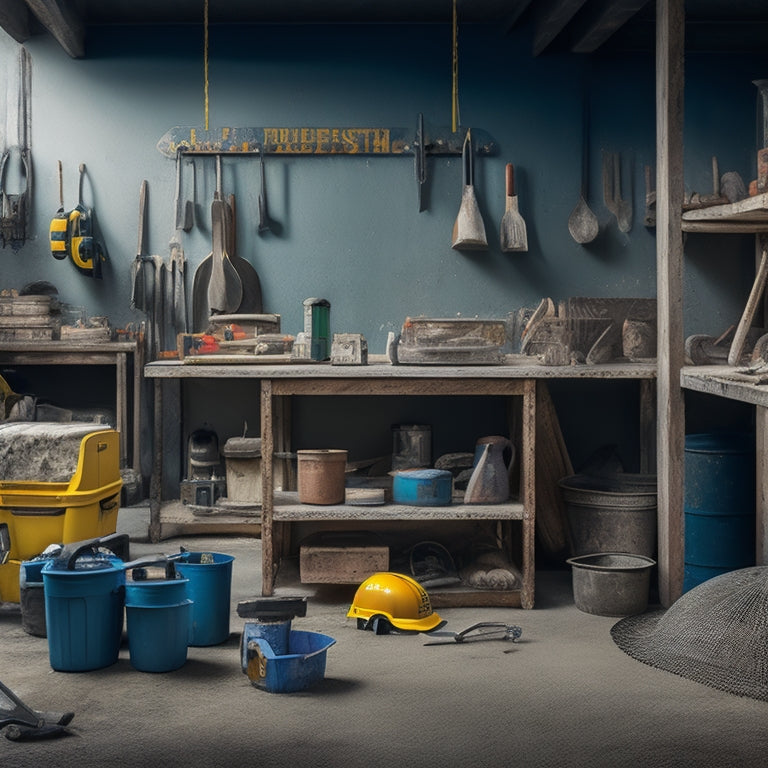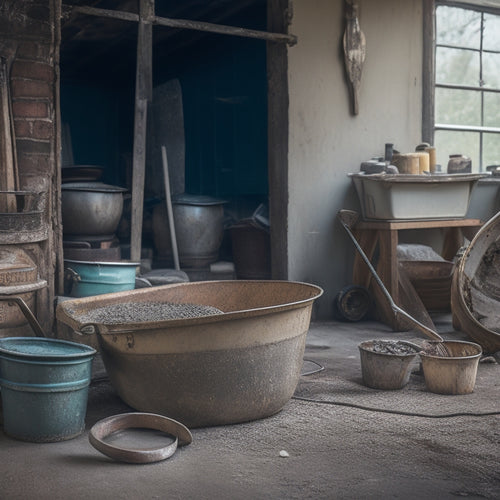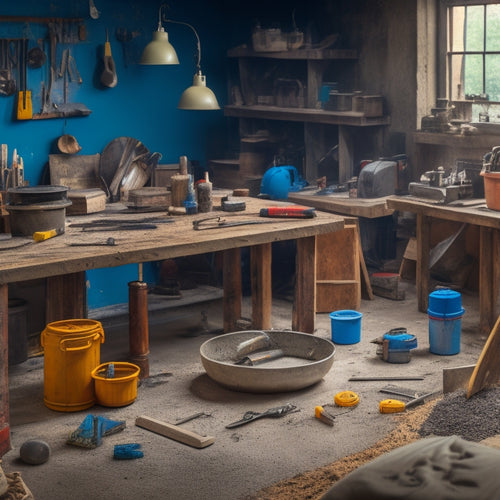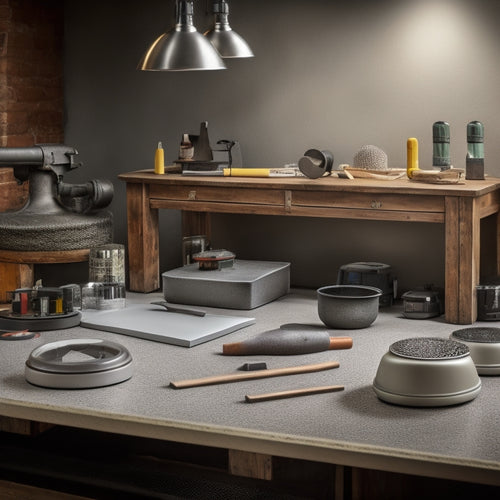
7 Tips for Buying Tools for Concrete Construction
Share
When buying tools for your concrete construction project, start by setting a realistic budget that balances quality, frequency of use, and project scope. Identify the essential tools you need, including mixers, trowels, edgers, and safety gear. Choose durable materials like high-carbon steel and stainless steel, and look for versatile tools that can perform multiple tasks. Research reputable brands, check their warranties and support, and test tools before making a final purchase. By following these tips, you'll be well on your way to selecting the right tools for your project, and you'll soon realize how to get the most out of your investment.
Key Takeaways
- Determine a realistic budget based on project scope, tool quality, and frequency of use to avoid overspending.
- Identify essential tools needed, such as concrete mixers, finishing trowels, edgers, and safety gear, to ensure project success.
- Choose tools made from durable materials like high-carbon steel, stainless steel, or heavy-duty aluminum to resist corrosion and withstand heavy use.
- Consider tool versatility options, such as multi-function tools, to simplify workflow, reduce clutter, and enhance project efficiency.
- Research tool brand reputation, warranty, and support to ensure quality, reliability, and protection of investments.
Set a Realistic Budget First
Set a Realistic Budget First
First and foremost, when preparing to buy tools for concrete construction, three essential factors will determine your budget: the scope of your project, the quality of tools you need, and the frequency of use. These factors will help you allocate your resources effectively, ensuring you get the right tools for the job without breaking the bank.
To set a realistic budget, consider your project's scope and the quality of tools you need. If you're working on a small project, you may not need high-end tools. However, if you're working on a large-scale project, investing in high-quality tools will pay off in the long run.
You should also think about how often you'll use the tools. If you'll be using them frequently, it's worth investing in durable, high-quality tools.
When it comes to budget allocation strategies, investigate tool financing options to spread the cost over time. This can help you afford the tools you need without depleting your cash reserves.
Identify Essential Tools Needed
Your concrete construction project requires a range of essential tools to secure efficient and effective execution. You can't afford to compromise on the quality of tools, as it directly impacts the outcome of your project.
Start by identifying the must-haves, such as concrete mixers, which are vital for mixing and blending concrete to the right consistency. You'll also need finishing trowels in various sizes to achieve a smooth, even finish.
Other essential tools include edgers, jointers, and float blades for finishing and smoothing the concrete surface.
Don't forget about safety gear, such as hard hats, safety glasses, and steel-toed boots, to protect yourself and your team from potential hazards.
Additionally, you'll need measuring and testing tools, like levels and concrete testers, to verify the concrete meets the required specifications.
Take the time to research and prioritize the tools you need, and make certain you have them on hand before starting your project.
Choose Durable Tool Materials
With your list of necessary tools in hand, it's important to focus on the materials that will make them last. When it comes to concrete construction tools, durability is key. You'll want to choose tool material types that can withstand the rigors of the job site. For example, look for tools made from high-carbon steel, stainless steel, or heavy-duty aluminum. These materials are resistant to corrosion and can handle heavy use.
In addition to choosing durable materials, it's crucial to follow proper maintenance tips to extend the life of your tools. Regularly clean and lubricate moving parts, and store tools in a dry, protected area. This will help prevent rust and damage from exposure to the elements.
You should also perform routine inspections to identify any signs of wear or damage. By selecting the right tool materials and following these maintenance tips, you'll be able to get the most out of your investment and guarantee your tools continue to perform at their best.
Consider Tool Versatility Options
Frequently, concrete construction projects require a variety of tools to get the job done efficiently. Instead of buying separate tools for each task, consider investing in multi-function tools that can perform multiple tasks. These tools can simplify your workflow, reduce clutter, and save you money in the long run. For instance, a rotary hammer that can drill, chisel, and demolish can replace three separate tools.
When selecting multi-function tools, look for tool compatibility. Verify that the tool's attachments and accessories are compatible with your existing tools and equipment. This will enable you to maximize their use and reduce waste.
Additionally, consider the tool's versatility regarding its ability to adapt to different materials, such as concrete, steel, or wood. By choosing tools with versatile functionality, you can tackle a wide range of tasks with confidence, making your concrete construction projects more efficient and successful.
Research Tool Brand Reputation
When evaluating tool options for your concrete construction projects, consider the reputation of the manufacturer behind the tool. A reputable brand can make all the difference in the quality and reliability of the tools you purchase.
Here are a few ways to research a brand's reputation:
-
Read brand reviews: Look up reviews from other customers who've used the brand's tools in the past. Pay attention to the overall rating and read the comments to get a sense of the brand's strengths and weaknesses.
-
Check user testimonials: Look for testimonials on the brand's website or social media pages. These can give you an idea of how the brand's tools have performed in real-world scenarios.
-
Research industry certifications: Check if the brand has any industry certifications, such as ISO or ANSI certifications. These can indicate that the brand meets certain standards for quality and safety.
Check Tool Warranty and Support
You've researched a brand's reputation, now it's time to dig deeper into the specifics of the tool itself. One significant aspect to take into account is the warranty coverage offered by the manufacturer.
Look for tools with extensive warranties that cover parts and labor for a reasonable amount of time. A good warranty can provide peace of mind and protect your investment.
Additionally, investigate the manufacturer's customer support. Are they available to answer questions and provide assistance when you need it? Do they offer online resources, such as tutorials and FAQs, to help you troubleshoot issues? A manufacturer with dependable customer support can save you time and frustration in the long run.
Be sure to check the warranty terms and conditions, including what's covered, what's excluded, and the process for making a claim. A thorough understanding of the warranty and customer support can give you confidence in your tool purchase and guarantee you're prepared for any issues that may arise.
Test Tools Before Final Purchase
Three key considerations remain before finalizing your tool purchase: testing the tool, evaluating its performance, and appraising its durability.
You've done your research, read reviews, and checked the warranty, but nothing beats hands-on experience. Testing the tool allows you to assess its performance in real-world scenarios, identify potential issues, and get a feel for its ergonomics.
When testing, keep the following in mind:
-
Operate the tool under various conditions: Test the tool with different materials, in varying environmental conditions, and with different operators to gauge its versatility and reliability.
-
Evaluate its performance metrics: Measure the tool's speed, accuracy, and efficiency to determine if it meets your project requirements.
-
Gather user feedback: Ask colleagues or peers who've used the tool to share their experiences, providing significant perspectives into its strengths and weaknesses.
Frequently Asked Questions
How Often Should I Clean and Maintain My Concrete Construction Tools?
You should clean and maintain your concrete construction tools daily, or after each use, to prevent rust and extend their lifespan; establish a regular cleaning frequency and follow maintenance tips to guarantee peak performance.
Can I Rent Tools Instead of Buying Them for Occasional Projects?
Imagine yourself on a sporadic concrete project, wondering if renting tools makes sense. You'll find that renting can be cost-effective, especially for occasional projects, offering rental advantages like reduced upfront costs and minimal storage needs.
Are There Any Specific Safety Features I Should Look for in Tools?
When selecting tools, you'll want to prioritize safety; look for ergonomic design reducing fatigue and strain, and guarantee they meet rigorous safety certifications, such as OSHA or ANSI standards, to minimize risks on the job site.
How Do I Store Tools Properly When Not in Use to Prolong Their Life?
When not in use, you'll want to store your tools in a dry, protected area with humidity control to prevent rust and corrosion, ensuring they remain functional and prolonging their lifespan through proper tool storage.
Can I Use Tools Designed for Other Industries in Concrete Construction?
In the medieval era of construction, knights didn't wield swords in the kitchen; similarly, you shouldn't use tools designed for other industries in concrete construction, as they may not meet industry standards, ensuring tool compatibility is essential for best performance.
Conclusion
You've made it to the end of the tool-buying expedition! With these 7 tips, you're now equipped to build a concrete construction empire. Remember, the right tools are the keys to gaining access to a kingdom of quality, efficiency, and profitability. Don't settle for anything less - your business (and your sanity) depend on it. By following these guidelines, you'll be constructing masterpieces in no time, and your competitors will be green with envy!
Related Posts
-

Top Tools for Mixing Concrete at Home
When mixing concrete at home, you'll need a range of tools to guarantee a successful operation. Start with essential ...
-

Budget-Friendly Tools for DIY Decorative Concrete Profiling
You can achieve professional-grade decorative concrete results on a budget by investing in the right combination of e...
-

10 Best Tools for Sealed Concrete Finishing Success
When it comes to sealed concrete finishing success, you need a robust arsenal of specialized tools. Start with essent...


